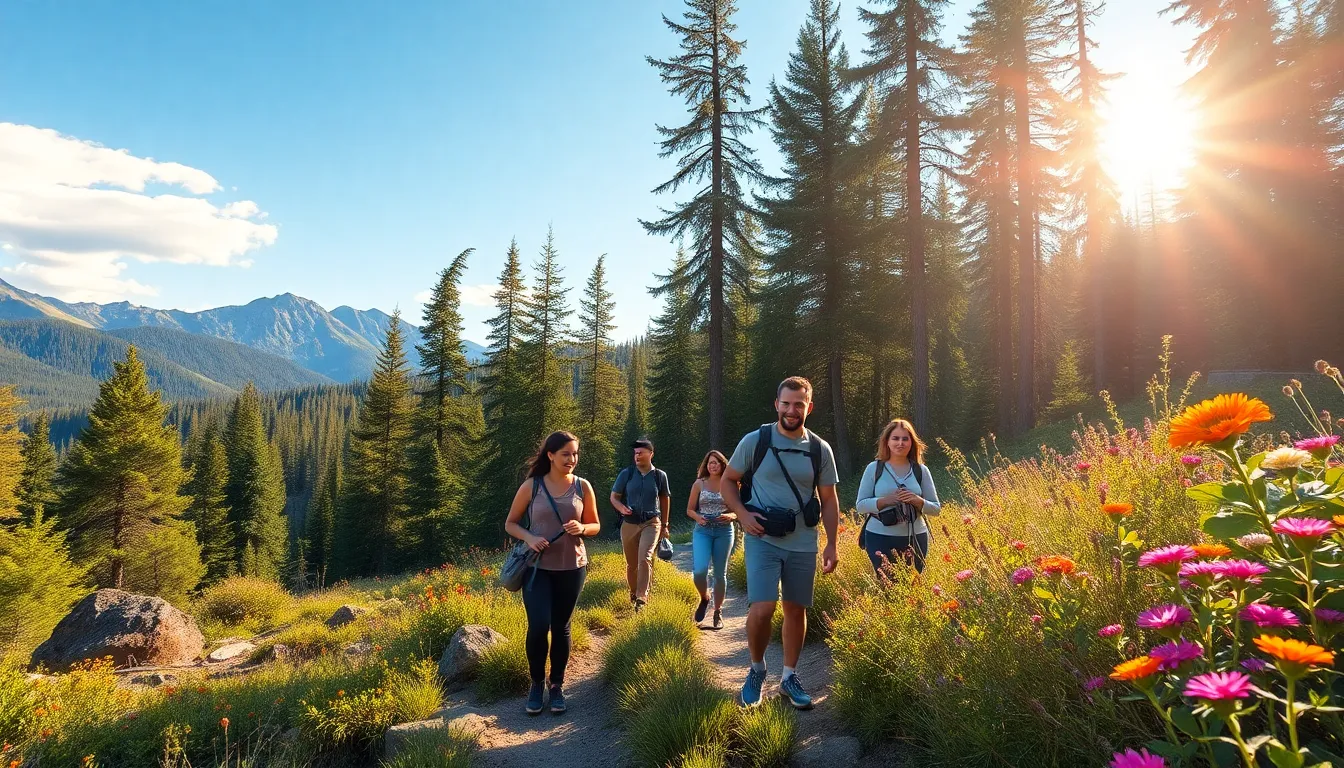Nature’s calling, and it’s not just to remind you to take out the trash. Stepping into the great outdoors isn’t just a chance to escape the four walls of daily life; it’s an invitation to rediscover adventure, serenity, and maybe even a little bit of dirt under your nails. Whether it’s hiking through lush forests or lounging by a sparkling lake, the outdoors offers a playground for the soul.
But let’s face it—sometimes the thought of braving the wild can feel as daunting as wrestling a bear. Fear not! With the right tips and tricks, exploring nature can be as easy as pie (and much less messy). So grab your gear, lace up those hiking boots, and get ready to embrace the fresh air. The great outdoors is waiting, and it promises a lot more than just mosquito bites and sunburns.
Table of Contents
ToggleThe Benefits of Spending Time Outdoors
Spending time outdoors offers numerous advantages for one’s overall health and wellness. Engaging with nature promotes a balanced lifestyle, fostering both physical and mental health.
Physical Health Advantages
Outdoor activities enhance cardiovascular fitness. Hiking, biking, and swimming work various muscle groups, improving endurance and strength. Exposure to sunlight increases vitamin D levels, which supports bone health. Natural settings encourage more movement, promoting weight control. Studies show that participants in outdoor activities demonstrate improved respiratory function and lower blood pressure. Fresh air reduces stress and enhances energy levels. Overall, outdoor time contributes to healthier lifestyles.
Mental Well-Being
Nature has a profound impact on mental health. It reduces symptoms of anxiety and depression significantly. Spending time outdoors boosts mood and promotes relaxation. Research indicates that individuals in natural settings exhibit higher levels of creativity and enhanced focus. Engaging in outdoor activities fosters social connections, reducing feelings of isolation. Mindfulness in nature encourages self-reflection and emotional resilience. The calming effects of natural environments play a crucial role in mental well-being.
Popular Outdoor Activities

Engaging with nature offers a variety of outdoor activities that cater to different interests and fitness levels. Here are some popular options.
Hiking and Trekking
Hiking provides an opportunity for exploration and physical fitness. Many trails, ranging from easy walks to challenging climbs, allow enthusiasts to experience diverse ecosystems. Trekking often involves longer, more strenuous hikes through remote areas, making it ideal for those seeking adventure and solitude. The Appalachian Trail, for example, spans over 2,190 miles and attracts millions of hikers annually. Besides enjoying picturesque views, participants also boost cardiovascular health and enhance overall well-being.
Camping and Outdoor Living
Camping invites individuals and families to immerse themselves in the outdoors. Options like tent camping and RVing enable relaxation and bonding in nature. Campgrounds frequently have amenities like fire pits and restrooms, ensuring comfort while disconnected from daily life. Surrounding oneself with trees and lakes fosters tranquility, while cooking over an open flame adds to the experience. Sites like Yellowstone National Park offer stunning landscapes and wildlife encounters, making them popular camping destinations.
Water Sports
Water sports amplify outdoor excitement. Activities such as kayaking, paddleboarding, and fishing attract individuals and groups seeking fun on lakes, rivers, and oceans. Kayaking encourages exploration of serene rivers, while paddleboarding offers a balanced workout on calm waters. Enthusiasts can also set out for fishing trips that allow relaxation and adventure while waiting for the catch of the day. Locations such as the Great Lakes and the Gulf of Mexico are prime areas to enjoy these water activities and stay active in a refreshing environment.
Outdoor Gear and Equipment
Equipping oneself with the right outdoor gear ensures a safe and enjoyable experience in nature. Different activities require specific items that cater to various skill levels and preferences.
Essential Gear for Beginners
Essentials for beginners include sturdy hiking boots, a weather-appropriate backpack, and a reliable water bottle. A quality map or GPS device aids navigation, while a basic first-aid kit provides peace of mind. Staying warm with insulating layers and rain gear becomes crucial for comfort. Lightweight tents or hammocks also enhance camping experiences, allowing for restful nights outdoors. Choosing versatile clothing made from moisture-wicking materials enhances overall comfort during physical activity. Beginners benefit from investing in gear that combines functionality with affordability.
Advanced Equipment for Enthusiasts
Enthusiasts often seek high-quality gear that improves performance and enhances outdoor adventures. Lightweight, high-strength tents, and specialized sleeping bags provide comfort in various climates. Technical clothing designed for extreme weather conditions prioritizes safety and mobility. Optimized bicycles and kayaks can elevate outdoor experiences, enabling exploration of rugged terrains and waterways. Navigation tools that include advanced GPS systems enhance route planning and safety measures. Investing in multifunctional tools like pocket knives increases convenience during unforeseen situations. Quality gear contributes to achieving personal goals in outdoor activities.
The Impact of Nature on Society
Nature benefits society in various ways, influencing health, community, and environment. The connection people form with nature fosters a sense of belonging and responsibility.
Conservation Efforts
Conservation initiatives play a crucial role in protecting ecosystems and natural resources. Organizations, such as The Nature Conservancy and WWF, work tirelessly to promote biodiversity and restore habitats. They engage local communities to advocate for sustainable practices and educate individuals about environmental stewardship. Collaborative projects, including reforestation, clean-up days, and wildlife preservation, strengthen community ties while maintaining ecological balance. Effective conservation strategies also enhance recreational spaces, making natural areas accessible and enjoyable for everyone.
Community Outdoor Programs
Community outdoor programs enrich lives by encouraging local engagement in nature activities. Programs like “National Public Lands Day” promote volunteer efforts across parks and natural reserves, inviting participation from all age groups. Outdoor education initiatives introduce children to environmental science, teaching them about nature’s role through hands-on experiences. Local governments often sponsor hiking clubs, outdoor fitness classes, and wildlife observation tours, fostering social connections while promoting physical activity. These programs inspire shared experiences that enhance appreciation for nature and contribute to healthier lifestyles.
Embracing the outdoors opens up a world of adventure and rejuvenation. Nature not only enhances physical health but also nurtures mental well-being. Engaging in outdoor activities fosters connections with both the environment and fellow adventurers.
With the right gear and mindset anyone can explore the beauty that surrounds them. From hiking trails to serene lakes there’s an opportunity for everyone to find their place in nature.
As individuals and communities come together to protect and cherish these natural spaces the benefits extend far beyond personal enjoyment. The call to venture outdoors is a call to a healthier and more connected life.


